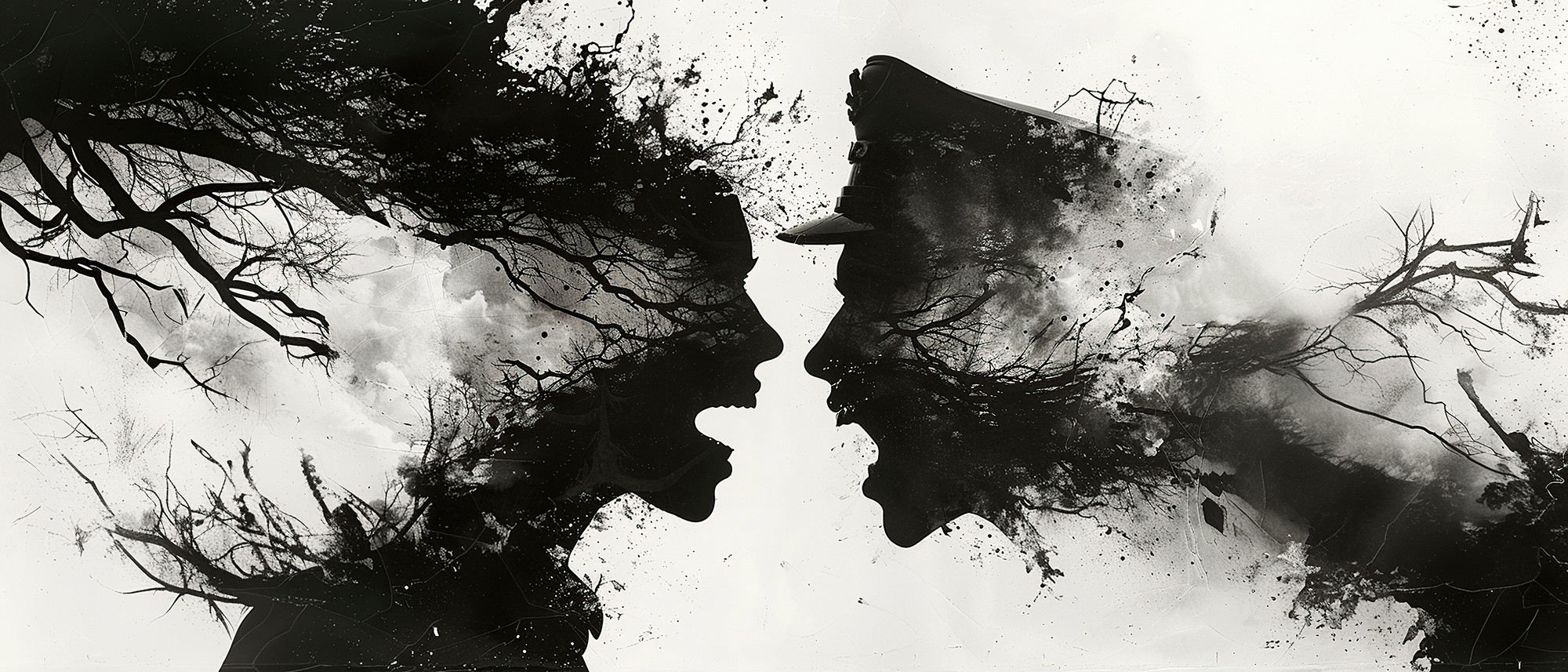
Fearful of Others
Description
A sense of anxiety or discomfort around people, driven by fear of judgment, rejection, or harm. This fear often leads to avoidance or tension in social situations, reflecting vulnerability and insecurity in interactions with others. If this resonates with you, this is the supplication for you.
اَللّٰهُمَّ اكْفِنِيْهِمْ بِمَا شِئْتَ
Allāhumma-kfinīhim bimā shi’ta.
Translation:O Allah, suffice me from them, with what You choose.
Suhaib reported that Allah's Messenger (ﷺ) thus said:
There lived a king before you and he had a (court) magician. As he (the magician) grew old, he said to the king: I have grown old, send some young boy to me so that I should teach him magic. He (the king) sent to him a young man so that he should train him (in magic). And on his way (to the magician) he (the young man) found a monk sitting there. He (the young man) listened to his (the monk's) talk and was impressed by it. It became his habit that on his way to the magician he met the monk and set there and he came to the magician (late). He (the magician) beat him because of delay. He made a complaint of that to the monk and he said to him: When you feel afraid of the magician, say: Members of my family had detained me. And when you feel afraid of your family you should say: The magician had detained me. It so happened that there came a huge beast (of prey) and it blocked the way of the people, and he (the young boy) said: I will come to know today whether the magician is superior or the monk is superior. He picked up a stone and said: O Allah, if the affair of the monk is dearer to Thee than the affair of the magician, cause death to this animal so that the people should be able to move about freely. He threw that stone towards it and killed it and the people began to move about (on the path freely). He (the young man) then came to that monk and Informed him and the monk said: Sonny, today you are superior to me. Your affair has come to a stage where I find that you would be soon put to a trial, and in case you are put to a trial don't give my clue. That young man began to treat the blind and those suffering from leprosy and he in fact began to cure people from (all kinds) of illness. When a companion of the king who had gone blind heard about him, he came to him with numerous gifts and said: If you cure me all these things collected together here would be yours. Be said: I myself do not cure anyone. It is Allah Who cures and if you affirm faith in Allah, I shall also supplicate Allah to cure you. He affirmed his faith in Allah and Allah cured him and he came to the king and sat by his side as he used to sit before. The king said to him: Who restored your eyesight? He said: My Lord. Thereupon he said: It means that your Lord is One besides me. He said: My Lord and your Lord is Allah, so he (the king) took hold of him and tormented him till he gave a clue of that boy. The young man was thus summoned and the king said to him: O boy, it has been conveyed to me that you have become so much proficient in your magic that you cure the blind and those suffering from leprosy and you do such and such things. Thereupon he said: I do not cure anyone; it is Allah Who cures, and he (the king) took hold of him and began to torment him. So he gave a clue of the monk. The monk was thus summoned and it was said to him: You should turn back from your religion. He, however, refused to do so. He (ordered) for a saw to be brought (and when it was done) he (the king) placed it in the middle of his head and tore it into parts till a part fell down. Then the courtier of the king was brought and it was said to him: Turn back from your religion. Arid he refused to do so, and the saw was placed in the midst of his head and it was torn till a part fell down. Then that young boy was brought and it was said to him: Turn back from your religion. He refused to do so and he was handed over to a group of his courtiers. And he 'said to them: Take him to such and such mountain; make him climb up that mountain and when you reach its top (ask him to renounce his faith) but if he refuses to do so, then throw him (down the mountain). So they took him and made him climb up the mountain and he said: O Allah, save me from them (in any way) Thou likest and the mountain began to quake and they all fell down and that person came walking to the king. The king said to him: What has happened to your companions? He said: Allah has saved me from them. He again handed him to some of his courtiers and said: Take him and carry him in a small boat and when you reach the middle of the ocean (ask him to renounce) his religion, but if he does not renounce his religion throw him (into the water). So they took him and he said: O Allah, save me from them and what they want to do. It was quite soon that the boat turned over and they were drowned and he came walking to the king, and the king said to him: What has happened to your companions? He said: Allah has saved me from them, and he said to the king: You cannot kill me until you do what I ask you to do. And he said: What is that? He said: You should gather people in a plain and hang me by the trunk (of a tree). Then take hold of an arrow from the quiver and say: In the name of Allah, the Lord of the young boy; then shoot an arrow and if you do that then you would be able to kill me. So he (the king) called the people in an open plain and tied him (the boy) to the trunk of a tree, then he took hold of an arrow from his quiver and then placed the arrow in the bow and then said: In the name of Allah, the Lord of the young boy; he then shot an arrow and it bit his temple. He (the boy) placed his hands upon the temple where the arrow had bit him and he died and the people said: We affirm our faith in the Lord of this young man, we affirm our faith in the Lord of this young man, we affirm our faith in the Lord of this young man. The courtiers came to the king and it was said to him: Do you see that Allah has actually done what you aimed at averting. They (the people) have affirmed their faith in the Lord. He (the king) commanded ditches to be dug at important points in the path. When these ditches were dug, and the fire was lit in them it was said (to the people): He who would not turn back from his (boy's) religion would be thrown in the fire or it would be said to them to jump in that. (The people courted death but did not renounce religion) till a woman came with her child and she felt hesitant in jumping into the fire and the child said to her: 0 mother, endure (this ordeal) for it is the Truth.
Sahih Muslim 3005
حَسْبُنَا اللّٰهُ وَنِعْمَ الْوَكِيْلُ
Ḥasbunallāhu wa niʿmal Wakīl.
Translation:Allah is enough for us and He is the Best Protector.
Ibn ʿAbbās (radiy Allāhū ‘anhumā) narrated: “[the above] was said by Ibrāhīm (‘alayhis-salām) when he was thrown into the fire; and it was said by Muhammad ﷺ when they (i.e. the hypocrites) said, “A great army is gathering against you, therefore, fear them,” but it only increased their faith and they said: “Allah is Sufficient for us, and He is the Best Disposer (of affairs, for us).” (3.173) (Bukhārī 4563)
اَللّٰهُمَّ إِنَّا نَجْعَلُكَ فِيْ نُحُوْرِهِمْ ، وَنَعُوْذُ بِكَ مِنْ شُرُوْرِهِمْ
Allāhumma innā najʿaluka fī nuḥūrihim, wa naʿūdhu bika min shurūrihim.
Translation:O Allah, we make You our shield against them and we seek refuge in You from their evil.
When the Messenger of Allah ﷺ was apprehensive of [a group] of people, he would say: [the above]. (Abū Dāwūd 1537)
اَللّٰهُمَّ أنْتَ عَضُدِيْ وَأَنْتَ نَصِيْرِيْ ، بِكَ أَحُوْلُ ، وبِكَ أصُوْلُ ، وَبِكَ أُقَاتِلُ
Allāhumma Anta Aḍudī wa Anta Naṣīrī, Bika aḥūlu, wa bika aṣūlu, wa bika uqātil.
Translation:O Allah, You are my aid and helper; by You I move, by You I attack, and by You I fight.
Anas b. Mālik (raḍiy Allāhu ‘anhu) narrated that when the Messenger of Allah ﷺ went on an expedition, he said [the above].” (Abū Dāwūd 2632)
اَللّٰهُ اَللّٰهُ رَبِّيْ ، لاَ أُشْرِكُ بِهِ شَيْئًا
Allāhu Allāhu Rabbī, lā ushriku bihi shay’ā.
Translation:Allah, Allah is my Lord, I do not assign anything as a partner to Him.
Asmā bint ʿUmays (raḍiy Allāhu ‘anhā) narrated that the Messenger of Allah ﷺ said to her: “Shall I not teach you words for you to say in times of distress?” or “when in distress?”. He then said [the above]. (Abū Dāwūd 1525)
اَللّٰهُمَّ اسْتُرْ عَوْرَاتِنَا وَاٰمِنْ رَوْعَاتِنَا
Allāhumma-stur ‘awrātinā wa āmin raw‘ātinā.
Translation:O Allah, conceal our faults and assuage my fears.
Abū Sa‘īd al-Khuḍrī (raḍiy Allāhu ‘anhu) narrates: “We (the Companions) said on the Day of Khandaq (Trenches): ‘O Messenger of Allah, is there anything we can say? For the hearts have reached the throats (out of fear).’ He ﷺ replied: ‘Yes! (Say) [the above].’ Abū Sa‘īd al-Khuḍrī says: ‘Allah, Mighty and Majestic destroyed the faces of the enemy with wind and Allah made them face defeat through wind.’” (Ahmad 10613)
اَللّٰهُمَّ مُنْزِلَ الْكِتَابِ ، ومُجْرِيَ السَّحَابِ ، وهَازِمَ الْأحْزَابِ ، اهْزِمْهُمْ وانْصُرْنَا عَلَيْهِمْ
Allāhumma munzila-l-kitāb, wa mujriya-s-saḥāb, wa hāzima-l-aḥzāb, ihzimhum wa-n-ṣurnā ʿalayhim.
Translation:O Allah, Revealer of the Book, Mover of the clouds, Defeater of the tribes, defeat them and grant us victory over them.
ʿAbdullāh b. Abī Awfā (raḍiy Allāhu ‘anhu) reported that the Messenger of Allah ﷺ, on one of the days that he met the enemy, waited until the sun rose, the stood among the people and said: “O people, do not look forward to meeting the enemy, but ask Allah for well-being. When you meet them, be steadfast. And know that Paradise is under the shadow of swords.” Then he said [the above]. (Bukhārī 3025)
اَللّٰهُمَّ رَبَّ السَّمٰـوٰتِ السَّبْعِ ، وَرَبَّ العَرْشِ العَظِيْمِ ، كُنْ لِيْ جَارًا مِنْ فُلَانِ بْنِ فُلَانٍ ، وَأَحْزَابِهِ مِنْ خَلَائِقِكَ ؛ أنْ يَّفْرُطَ عَلَىَّ أحَدٌ مِنهُمْ أوْ يَطْغٰى ، عَزَّ جَارُكَ ، وَجَلَّ ثَنَاؤُكَ ، وَلَا إِلٰهَ إِلَّا أَنْتَ
Allāhumma Rabb-as-samāwāti-s-sabiʿ, wa Rabba-l-ʿArshi-l-ʿaẓīm, kun lī jāran min fulāni-bni-fulān, wa aḥzābihi min khalāiqiqa; ay-yafruṭa ʿalayya aḥadun minhum aw yaṭgā, ʿazza jāruk, wa jalla thanā’uk, wa lā ilāha illā Ant.
Translation:O Allah, Lord of the seven heavens, Lord of the Magnificent Throne, be for me a support against [such and such a person] and his helpers from among your creatures, lest any of them abuse me or do me wrong. Mighty is Your patronage, and glorious are Your praises. There is none worthy of worship but You.
ʿAbdullāh b. Masʿūd (raḍiy Allāhu ‘anhu) narrated that the Prophet ﷺ said: “When one of you fears a ruler, they should say [the above].” (Ṭabarānī in Muʿjam al-Kabīr)




